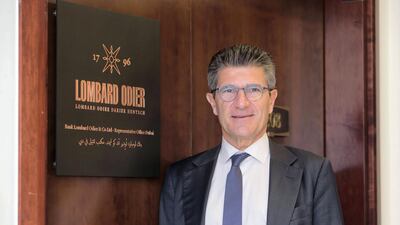Investors in the Middle East are increasingly hedging risks through portfolio diversification, venturing into private equity investment amid the global economic slowdown, Brexit uncertainty and trade war, a Lombard Odier executive said.
"They [Middle East investors] want diversification on all asset classes and are interested in private equity, because it is becoming a very good way to diversify the risks," Patrick Odier, senior managing partner at the Swiss private bank, told The National on Tuesday.
The tariff war between the two biggest global economies, a disorderly Brexit, geo-political tensions and growing global indebtedness are some of the major risks facing the world economy and investors. However, a global recession is not on the cards, Mr Odier noted.
His comments were echoed by Christine Lagarde, the managing director of the International Monetary Fund, who on Tuesday said the global economy is at a “delicate moment” amid rising trade tensions, high levels of debt and uncertainty over Brexit. The IMF lowered its global growth forecast for 2019 and 2020 in January. The global economy is set to expand 3.5 per cent in 2019 and 3.6 per cent the year after, 0.2 and 0.1 percentage points lower than the fund's October forecasts.
World trade also shrank by 0.3 per cent in the fourth quarter of 2018 and is likely to grow by 2.6 per cent this year, slower than the 3 per cent growth in 2018 and below a previous forecast of 3.7 per cent, the World Trade Organisation said on Tuesday.
Mr Odier, however, says there is “light at the end of the tunnel” as far as the ongoing trade war between China and the US is concerned.
“We think the world can offer good opportunities in 2019. The essence is risk management,” he said.
The Geneva-headquartered private bank, which has globally about 20 to 25 per cent asset allocation into less liquid assets such as private equity and infrastructure, is seeing demand, particularly from the Middle East for different types of investments, with sustainability higher on investors’ agenda, he added.
The allocations in the portfolio of an average investor in the region is spread 40 per cent on equities and 40 per cent on fixed income assets and the rest is divided between alternative investments including exposure to hedge funds, private equity and infrastructure assets, Christophe Lalandre, managing director of Lombard Odier Dubai office explained.
However, if the portfolios had included 10 per cent more in private equity or infrastructure assets last year, their performance would have been totally different, despite a slump in global equity markets towards the end of 2018, Mr Odier noted.
“We are advising our clients to diversify into those asset classes,” he said.
The asset manager has seen a significant rise in its regional client-base, which includes, family offices, industrial and trading-related companies, institutions and entrepreneurs.
“What you have to consider is that 80 per cent of the companies in the UAE [alone] are family owned,” said Mr Lalandre.
The oldest Swiss private bank is not only doing wealth management services in the region, but it is also providing governance advise to clients in terms of how they could organise their businesses around the family and in terms of assets classes.
Lombard Odier, with $276bn (Dh1.01 trillion) in assets under management, expects to still double its business in the Middle East.
The region is among the fastest growing markets for Lombard Odier and the bank is targeting the region to account for 10 per cent of its total assets from roughly 5 per cent at the moment, emulating the growth over the past few years.
“We have been doubling our asset base in the last five to seven years,” he said.
Ultra-high-net-worth individuals in the Middle East – people with a net worth of more than $30 million – are projected to increase by 20 per cent in the next five years, according to a new report by global property consultancy Knight Frank. That means the region will add another 1,660 people to the upper band of the very wealthy by 2023.
The bank is in the process of opening this year its office in the capital’s financial hub, Abu Dhabi Global Market, which will focus on the its advisory business in the Middle East.


